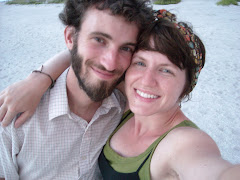I've been reading a book titled African Friends and Money Matters. A previous MCCer said it helped a lot with her cultural orientation to her work in Africa and Haiti. I've been reading it over the past week.
In the past I thought of culture as the type of art, architecture, food, etc. that a culture produces. In many places we've experienced "culture" by eating the food, visiting museums, walking the streets, and looking at homes, and people-watching. I've thought of myself as a fan of foreign culture. The energy conservation and bicycling culture in the Netherlands intrigues me, narrow cobblestone streets in Lyon draw me in, and open markets in China are great fun.
This new book has opened up a whole new world to the word culture. Haiti has a distinct art culture, architecture, and cuisine. The underlying pressure on each of these is that there is not a lot of support in the way of money or government infrastructure. That being said, it seems many cultural traditions evolved from this reality and colonialism (of course).
In Haiti there are almost no governmental services or infrastructure. For example: If you have a bad road that is in need of repair, you don't wait for the township to fix it. Instead, you gather everyone together in the morning by walking the streets with a megaphone; as you work on the street, you extract tolls from those who want to pass by. (Sharon experienced this firsthand Friday morning.) In the U.S. we pay taxes so the roads are taken care of, trash picked up, poor given food, police walk the streets, etc. If you have never known of these services - and think they will never work effectively - you live in a different economic reality.
At some point in life, everyone everywhere needs or wants more than they have. In the U.S., we use credit cards, buy cars on loan, finance our houses or lawn tractors, get TVs on a 0% interest credit card at Best Buy, pay for college with student loans, etc. You then owe all of these institutions a monthly payment for...forever. Here none of that exists: you may be able to get a loan from a bank, but it's not common.
So what is the normal Haitian to do? They borrow from whoever they think has more than they do. Friends, family, and wealthy strangers are all viable options. They borrow from others as we borrow from lending institutions in the U.S. (present economic conditions aside). They generally have no qualms in asking someone for money. If a stranger on the street asked me for money in the U.S., most likely I would say no and be on my way. Here they see me and see Wealthy American That Most Definitely Has More Money Than He Needs so they feel just fine asking. It seems that anyone that has money is almost obliged to give it to others.
Being asked for money in Port-au-Prince is very common, and as in most other cities in the world, people keep on walking and going about their business. Where we live in Desarmes, the people that ask for money are your neighbors, co-workers, and business associates. You will see them almost every day for the next few years.
This is my current struggle and culture clash. My knee-jerk reaction to being asked for money is NO, but their knee-jerk reaction is to ask for money. In the U.S. if you lend a friend money, the friendship becomes very fragile, and it just may be ruined if everything is not paid back. Here, it seems that friendships are made by lending money and helping out; it's seen as standing in solidarity with that person. As the book notes, when you lend money, the recipient is then somewhat obliged to come and visit, possibly pay some of the money back, and when you are in greater need than he/she in the future, come to your aid. Friends are your savings account to help you in the future.
Sound easy? Well, reading this book has been helpful. Before this, when I was asked for money I quickly bristled and wondered if I had BANK stamped on my forehead. Now at least I can see it as a valuable quality of the culture. The difficultly now is piloting this foreign financial reality without offending too many people and without destroying relationships along the way.
Some things we have been asked:
Bonjour, Give me five dollars.
Bonjour, What do you have to give me?
Blan, give me ten dollars.
I know Haiti has its own unique culture and is not simply a small African country in the Caribbean. But it does seem there are many things in Haitian culture that can be directly attributed to its African roots, and many things in this book seem to be reflected in Haitian life.
Sunday, October 26, 2008
Subscribe to:
Post Comments (Atom)


2 comments:
Wow, what an incredible reality in which to live. It's amazing how different some of the most basic uman relationships, such as firendship, can be to different people around the world. Thanks for taking the time to share your reflections.
I can so totally imagine what you mean. Although you say there's a difference between city life and countryside, it's the same here in Port-au-Prince. That is one of the most difficult things. You never know how to deal with it, or what to say, or whom to help.
Margot
Post a Comment